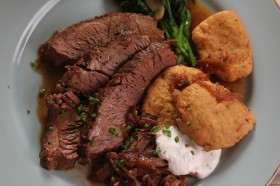 My husband Bill has been telling me about his aunt Rifka and her asbestos hands for as long as we’ve known each other. He claims there was no pot so hot she couldn’t pick it up barehanded. (This amazing ability seems just slightly less amazing to me since I went to cooking school and developed some heat resistance of my own.) He also used to brag about his aunt’s delicious flying discs. I always wondered just what the heck they were and decided to find out when I started on this book.
My husband Bill has been telling me about his aunt Rifka and her asbestos hands for as long as we’ve known each other. He claims there was no pot so hot she couldn’t pick it up barehanded. (This amazing ability seems just slightly less amazing to me since I went to cooking school and developed some heat resistance of my own.) He also used to brag about his aunt’s delicious flying discs. I always wondered just what the heck they were and decided to find out when I started on this book.
Rifka Silverberg Mellen was actually Bill’s great aunt-his mother’s mother’s older sister. She and Uncle Peter lived upstairs from Esther and her folks in Sheepshead Bay in Brooklyn, where the whole family flourished after fleeing Odessa in the first decade of the twentieth century. It turns out that Rifka’s flying discs are nothing more exotic than matzo balls formed into silver dollar-sized discs and served in brisket gravy instead of chicken soup. Contrary to the image called up by their Space Age sobriquet, flying discs are not exactly lighter than air. In truth, they are dense and heavy. It’s more accurate (if considerably less glamorous) to call them sinkers, which is what Bill’s aunt Yetta called hers. Whatever. They’re scrumptious.
Serves 8
For the braised brisket:
1 large head garlic, separated into cloves
1 cup all-purpose flour
2 teaspoons kosher salt
1/2 teaspoon freshly ground black pepper
One 4- to 5-pound beef brisket
2 tablespoons olive oil
2 large onions, thinly sliced
3 cups dry red wine
1/4 cup tomato paste
2 bay leaves, preferably Turkish
1 teaspoon dried thyme
1 quart chicken stock, preferably homemade
For the flying discs:
1/4 cup chicken stock, preferably homemade
4 large eggs, beaten
2 tablespoons unsalted butter, melted
1 teaspoon kosher salt
1 cup matzo meal
To make the brisket, preheat the oven to 325°F. Fill a small saucepan with water and bring to a boil over high heat. Add the garlic, bring back to a boil, and cook rapidly until slightly softened, about 1 minute. Use a slotted spoon to transfer the garlic to a bowl of ice water. Peel when cool enough to handle.
Combine the flour, salt, and pepper in a large shallow dish or large platter. Add the brisket and turn to coat on all sides. Shake off the excess. Heat the oil in a large covered casserole or Dutch oven over medium-high heat until almost smoking. Add the brisket and cook, turning often, until well browned, about 6 to 8 minutes per side. Transfer to a plate or platter and pour off all but 2 tablespoons of the fat. Stir in the onions and the peeled garlic. Reduce the heat to medium and cook, stirring often, until golden, about 10 minutes. Pour in the wine and stir to pick up any browned bits on the bottom of the casserole. Stir in the tomato paste and add the bay leaves and thyme. Increase the heat to high and bring to a boil. Cook rapidly, stirring often, until almost all the liquid has evaporated. Pour in the stock and bring back to a boil. Reduce the heat to medium and add the brisket. Cover tightly with a piece of foil, then cover the pot with the lid. Transfer to the lower third of the oven and cook until a fork comes out easily when pierced, 3 to 4 hours.
To make the disks, whisk the stock, eggs, and butter together in a small bowl. Stir in the salt and matzo meal to form a soft dough. Cover with plastic wrap and refrigerate until well chilled, about 1 hour. Bring a large pot of salted water to a boil over high heat. Working with 1 tablespoon of the dough at a time, use wet hands to form the dough into disks about 1 1/2 inches wide and 1/2 inch thick. You should have about 18 disks. Drop them into the boiling water and reduce the heat to medium low. Cover and simmer until the disks are puffy and cooked through, 30 to 35 minutes.
Transfer the brisket from the casserole to a cutting surface and cover loosely with foil. Let rest for 15 minutes. Gently skim the surface of the liquid in the casserole with a spoon to remove as much fat as possible. Remove and discard the bay leaves. Add the disks to the cooking liquid and cook on top of the stove over medium heat, covered until they’ve turned dark and have absorbed some of the sauce, about 10 minutes.
Thinly slice the brisket on an angle, cutting against the grain. Arrange the slices on a warmed serving platter or plate; place the disks on the side and ladle on the pan gravy. Serve warm.
From Sara Moulton Cooks at Home


